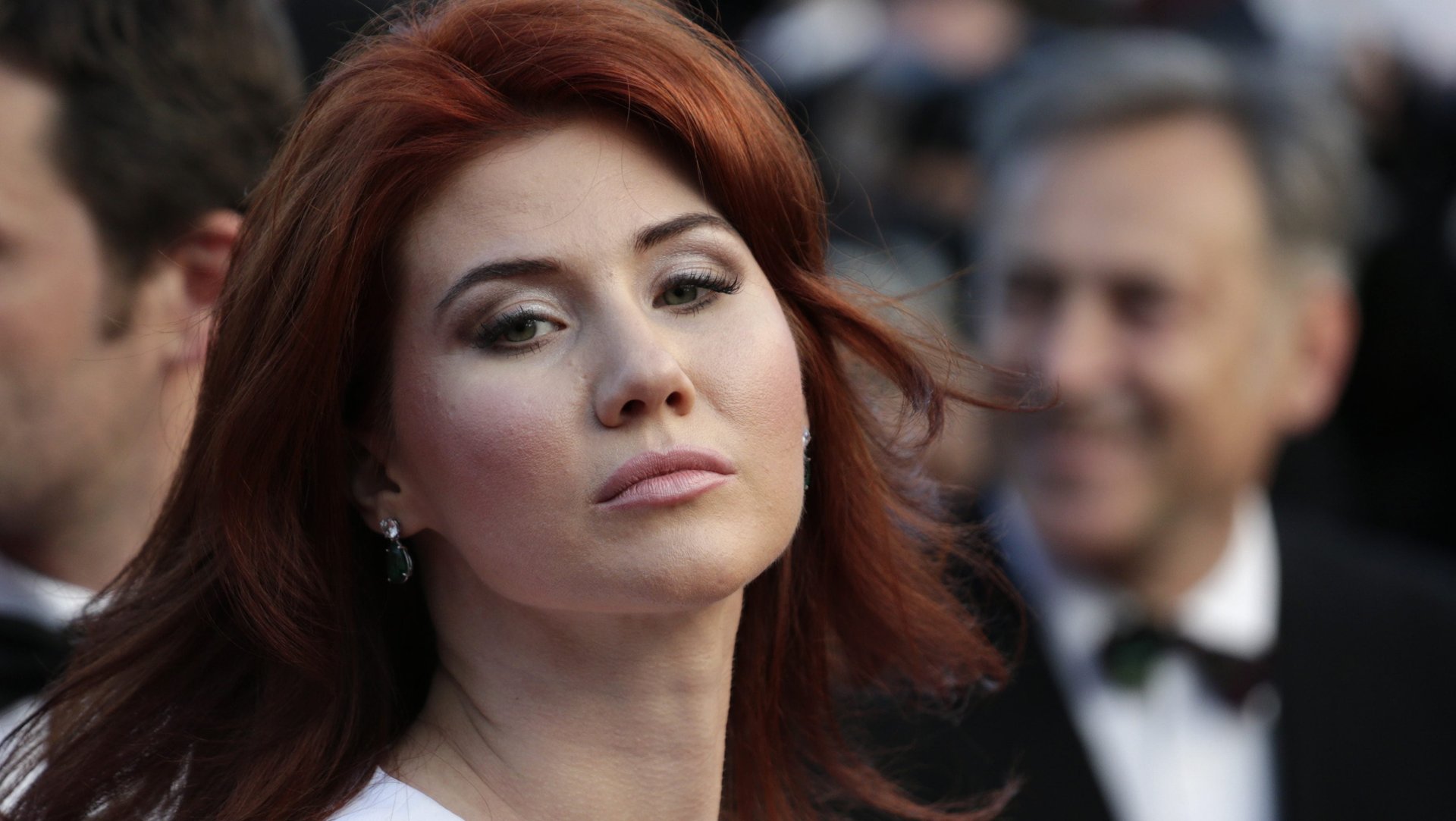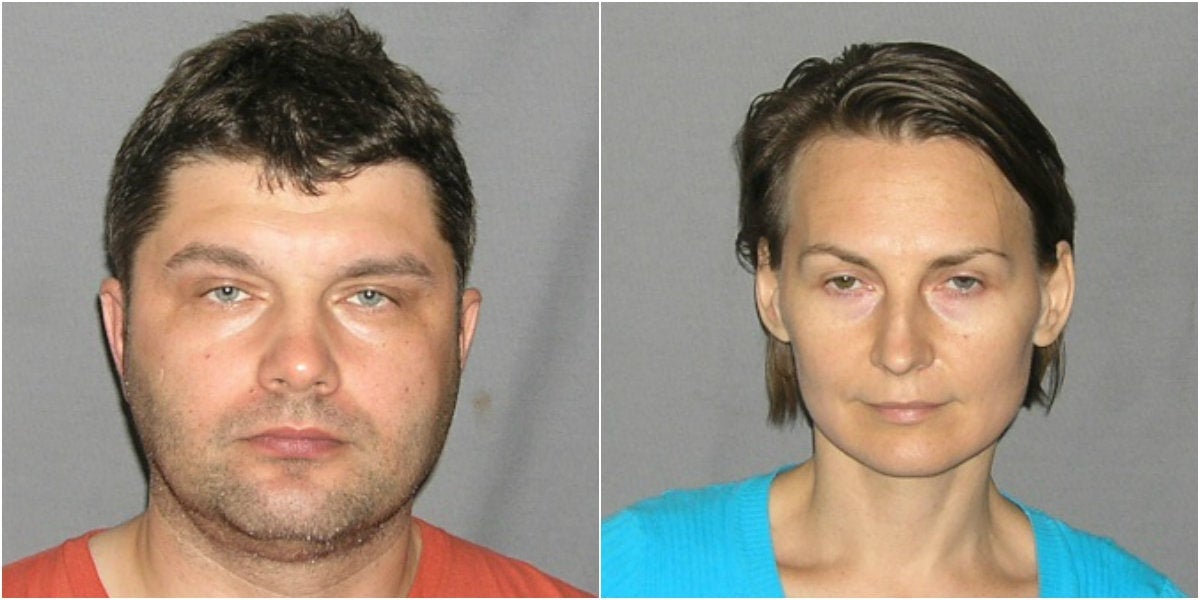The stranger-than-fiction story of the real Russian spies who inspired “The Americans”
In 2010, ten Russian sleeper agents were arrested in the United States after a decade-long FBI operation

In 2010, ten Russian sleeper agents were arrested in the United States after a decade-long FBI operation. In 2013, Joe Weisberg made a TV show about them: The Americans.
Suggested Reading
Though the acclaimed spy drama takes place in the early 1980s, when US-Soviet relations were on a razor’s edge, it’s suddenly the most topical series on American television. Weisberg, a former CIA operative, based his show on the 2010 spy ring, but decided to set it in the past, because—back in 2013—people no longer considered America’s relations with Russia to be fraught.
Related Content
“A modern day [setting] didn’t seem like a good idea,” he told Time ahead of the show’s premiere. “People were both shocked and simultaneously shrugged at the [Russian sleeper agent] scandal because it didn’t seem like we were really enemies with Russia anymore. An obvious way to remedy that for television was to stick it back in the Cold War.”
If Weisberg were starting from scratch today, it’s unclear if he would make the same decision to move his story back in time. After all, relations between the US and Russia today seem as strange as any fictional show currently on TV.
But perhaps not as strange as the true story of Russian spies that inspired Weisberg in the first place. In 2011, the FBI released dozens of images, video clips, and documents from “Operation Ghost Stories” that revealed new information about the Russian operatives who had been caught posing as ordinary Americans the year before. In the years since, we’ve learned a lot more about what ultimately happened to the real “Americans” whose story prompted Weisberg to write what became, arguably, the best show on television.
The Illegals Program
In The Americans, Phillip and Elizabeth Jennings are a sham married couple who are sent from the Soviet Union to a Washington, DC suburb, where they have two children who are unaware that their parents are anything other than what they seem. The series centers on Phillip and Elizabeth’s relationship, which starts as a mere cover, before turning into something much deeper.
In court documents, the US Department of Justice called the Russian spy ring unearthed in 2010 the “Illegals Program.” The spies were trained in Russia and then sent to the US (often through Canada, where they could create a more believable history) in order to gain access to intelligence from high-ranking officials in government and academia.
Most of these spies had lived in the US for a long time, spoke good English, held regular jobs, and even had children. They sometimes assumed the identities of real people who had died at a young age. Couples were paired together in Russia ”so that they can live together and work together in a host country, under the guise of a married couple,” the FBI alleged in its 2010 indictment. “Illegals who are placed together and cohabit in the country to which they are assigned will often have children together.”
Here’s how the justice department described the operation:
The FBI has conducted a multi-year investigation of a network of United States-based agents of the foreign intelligence organ of the Russian Federation (the “SVR”). The targets of the FBI’s investigation include covert SVR agents who assume false identities, and who are living in the United States on long-term, “deep-cover” assignments. These Russian secret agents work to hide all connections between themselves and Russia, even as they act at the direction and under the control of the SVR; these secret agents are typically called “illegals.”
In June 2010, the FBI arrested 10 “illegals,” including four couples. An eleventh man was arrested in Cyprus, but disappeared after posting bail. His current whereabouts are unknown.
The 10 other spies were charged in a federal court in Manhattan a week later, and all 10 pleaded guilty to secretly acting as agents of the Russian government. The US and Russia agreed to a prisoner swap: The “illegals” were deported to Russia in exchange for four people convicted by the Russian government of spying for Western countries. When asked by Tonight Show host Jay Leno why the US was seemingly short-changed on the deal, then-vice president Joe Biden joked that the 10 Russians arrested weren’t the most adept of spies.
“We got back four really good ones, Biden said. “And the ten [illegals], they’ve been here a long time, but they hadn’t done much.”
Indeed, the ten spies were not charged with espionage—a more serious offense—because they all failed to actually access and pass along any classified information. (Phillip and Elizabeth Jennings of The Americans have been considerably more successful than their real-life counterparts.)
Anna Chapman

The Russian spy who received by far the most media attention in the US was Anna Chapman, a 28-year-old redhead known for being “disarmingly attractive.”
British tabloids purported that Chapman had come perilously close to “honey-potting,” or seducing, a member of president Barack Obama’s cabinet, and that was the reason the FBI swooped in and arrested the spies when it did. But the FBI soon said such claims were patently false, and that the real impetus for the arrests was the work of another “illegal,” Cynthia Murphy, who had been in close contact with a friend and fundraiser of then US secretary of state Hillary Clinton.
Chapman, who lived in New York at the time of her arrest, was under close surveillance. Here she is chatting with an undercover FBI agent at a Manhattan bookstore:
In the years since being deported back to Russia, Chapman has had a successful career in television hosting and modeling. She posts frequently on Instagram, and appears to be sympathetic to current US president Donald Trump.
Vladimir and Lidiya Guryev (“Richard and Cynthia Murphy”)

One of the married couples, Vladimir and Lidiya Guryev, moved to the United States in the 1990s and assumed the names “Richard and Cynthia Murphy.” Cynthia got her undergraduate degree from New York University and an MBA from Columbia University. Her cover went deep—she worked for the Manhattan accounting firm Morea Financial Services, reportedly earning an annual salary of $135,000.
The couple moved to Montclair, New Jersey and had two daughters, Kate and Lisa (who were 11 and 9, respectively, at the time of their parents’ arrests). The children were reunited with their parents in Russia following the prisoner swap, but as US citizens, they are entitled to return and live in America if they choose. Federal privacy laws make it difficult to discern what became of them, or any of the other children who were minors at the time of the arrests.

Part of Cynthia’s assignment, according to court documents, was to collect information on Columbia University faculty and students, including those who applied to, or were already hired by, the CIA. She supervised the finances of Alan Patricof, a venture capitalist and philanthropist close to the Clintons.
Andrey Bezrukov and Yelena Vavilova (“Donald Heathfield and Tracey Lee Ann Foley”)

Andrey Bezrukov, who went by the name “Donald Heathfield,” had studied at Harvard’s John F. Kennedy School of Government before taking on a senior role at a consulting firm in Boston. His wife, Yelena (“Tracey”), stayed at home with their two children, Tim, 20, and Alex, 16. Both kids were born in Canada and were living normal lives in Cambridge, Massachusetts. When their parents were arrested for being Russian spies, Tim had just finished his sophomore year at George Washington University in Washington, DC.
The Foley children were the subject of an in-depth feature in the Guardian last year, which detailed their lives since their parents’ arrest. In December 2010, they were given Russian passports, and officially named Timofei and Alexander Vavilov—though neither identifies with being Russian. Alex goes to school in Europe and Tim works in finance in Asia.
According to the Guardian, the brothers have been fighting to win back their Canadian citizenship, revoked following their parents’ arrests. Alex has also been rejected for visas from France and Britain:
In 2012 he was admitted to the University of Toronto, and applied for a four-year student visa on his Russian passport. The visa was issued and he planned to depart for Canada on 2 September. But four days before he was due to leave, as he was packing his bags and exchanging emails with his future roommate, he received a phone call from the Canadian embassy in Moscow demanding he come for an urgent interview. The meeting was hostile; there were a lot of questions about his life and his parents. The visa was annulled before his eyes, and he lost his university place. Alex has since been rejected for French and British visas. Twice, he has been accepted to study at the London School of Economics, but both times did not get a visa. Eventually, he was able to get a visa to study elsewhere in Europe; Tim travels mainly in Asia, where many countries can be visited visa-free on a Russian passport.
“I lived for 20 years believing that I was Canadian and I still believe I am Canadian, nothing can change that,” Tim wrote in a court affidavit to win back his Canadian citizenship, cited by the Guardian. “I do not have any attachment to Russia, I do not speak the language, I do not know many friends there, I have not lived there for any extended periods of time and I do not want to live there.”
Perhaps Canada has been resistant to giving Tim and Alex their citizenship back because of a Wall Street Journal story from 2012, which cites US officials claiming that Tim had been recruited by his parents to become a spy (a process that was underway in last season of The Americans with the Jennings’ daughter, Paige):
His parents revealed their double life to him well before their arrest, according to current and former officials, whose knowledge of the discussion was based on surveillance by the Federal Bureau of Investigation that included bugging suspects’ homes. The officials said the parents also told their son they wanted him to follow in their footsteps.
He agreed, said the officials. At the end of the discussion with his parents, according to one person familiar with the surveillance, the young man stood up and saluted “Mother Russia.” He also agreed to travel to Russia to begin formal espionage training, officials said.
In the Guardian story, Tim denied the allegations. “Why would a kid who grew up his whole life believing himself to be Canadian, decide to risk life in prison for a country he had never been to nor had any ties to?” he asked.
The others
Mikhail Kutsik and Nataliya Pereverzeva (“Michael Zottoli and Patricia Mills”) lived in Seattle, Washington, both attending the University of Washington, Bothell, where they earned degrees in business. They had two young children and then moved to Arlington, Virginia, where they were arrested. The children were sent with them to Russia.
Mikhail Semenko, one of the two “illegals” to use their real name, studied at Seton Hall University and later worked for a travel agency. (Phillip and Elizabeth Jennings of The Americans manage their own travel agency.) He’s believed to be the youngest of the spies who were arrested.
Vicky Peláez and Mikhail Anatolyevich Vasenkov (Juan Lazaro) were married in 1983 in Peru. Peláez, a TV reporter, was the other ”illegal” to use her real name. The couple moved to New York and later had a son, Juan Lazaro Jr.—now a distinguished concert pianist who stayed in the US when his parents were deported to Russia.